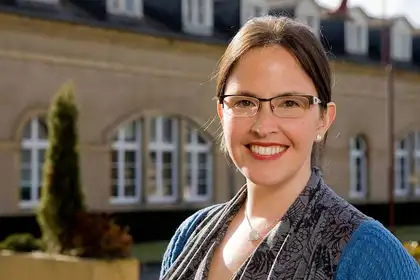
Dr Julia de Bres.
By Dr Julia de Bres
A colleague of mine at Massey University, Steve Elers, wrote an opinion piece recently on the “bewildering politics of gender pronouns”, in which he parodies linguistic innovation in pronoun use by claiming he will now refer to himself using the pronoun “zigazig ah”.
While Steve’s intent seems to be largely to ridicule, pronouns are indeed a political issue. So I respond here, as a colleague, a linguist and a parent.
Steve’s main concern appears to be the proliferation of new terms and pronouns reflecting gender diversity, which he finds baffling and unnecessary.
He lists the following terms in languages other than English: aikāne, ‘akava’ine, fa’afafine, faafatama, fakafifine, fakaleiti, māhū, palopa, tangata ira tāne, vakasalewalewa and whakawahine. These terms are not new, but describe the gender diversity that has long existed in our region of the Pacific.
These diverse Pacific gender identities were brutally suppressed during colonisation. If these terms are becoming more prominent now, this is something to welcome, because it shows the people they represent are regaining visibility.
The term takatāpui has a long history in te ao Māori, originally used to describe an “intimate companion of the same sex”. Although not new per se, takatāpui is increasingly claimed by Māori as a broader term to express a diverse gender or sexual identity.
The dominance of Pākehā ideas about gender and sexuality mean takatāpui can feel excluded from Māori spaces, while the Pākehā-centric nature of many rainbow spaces can also be unwelcoming.
In this climate, takatāpui is a powerful identity term that allows people to lay claim to an intertwined ethnic and gender identity and resist the ongoing effects of colonisation.
Steve goes on to list further terms in English that are without question newer, including gender diverse, genderqueer and non-binary. We could add agender, gender-fluid and others.
He also lists a range of pronouns people have developed to express a gender identity that exists outside the binary.
To people unfamiliar with gender diversity, this proliferation of terms and pronouns may be confusing, but it makes perfect sense linguistically.
It is a simple fact that social change brings about linguistic change – and vice versa, in a mutually reinforcing circle – and we are in a period of great social change when it comes to recognising gender diversity.
The number of gender-diverse people in the world is unlikely to have changed – currently representing between 1 and 2 per cent of the population in New Zealand – but greater social acceptance is encouraging gender-diverse people to be more open about their identities. As they do this, they seek terms to express themselves, which then appear in the language.
Operating in a society founded on a strict binary between male and female, it is not surprising that it takes some imagination and experimentation for gender-diverse people to develop terms that best represent them. These terms reflect the growing social possibilities a marginalised group have access to and they are cause for celebration.
As a linguist, I find the current linguistic innovation reflecting gender diversity exciting. As a parent of a gender-diverse child, I consider it lifesaving.
The recent Counting Ourselves survey shows that transgender and non-binary people in New Zealand are at severe risk of suicide, and young people particularly so. This is attributable not to gender identity per se, but to the prejudice and discrimination, gender-diverse people face as members of a highly marginalised group.
My child was a victim of gender-based violence at their previous school. At their current school, where they are loved and accepted, they have blossomed.
This blossoming has occurred alongside a change to a new identity term and a new pronoun. Did gender-affirming terms and pronouns play a role in my child’s increased wellbeing, as they have been shown to do for many trans people? Does it matter?
It matters that my child is happy.
As a colleague, I ask Steve and our fellow lecturers at Massey University what kind of teachers we want to be.
We have gender-diverse students in our classes, whether we know it or not. They have already faced almost insurmountable barriers just to be there.
Do we want to ridicule their identities, fan the flames of prejudice against them and make them feel unsafe in our classes? Do we want to risk their lives?
Or do we want to include them, accept them and celebrate them for who they are? No doubt about it, Steve, language is politicised. Let’s use it to empower, not to disempower.
Dr Julia de Bres is a senior lecturer in linguistics at Massey University’s School of Humanities. This article was first published in the Manawatū Standard.